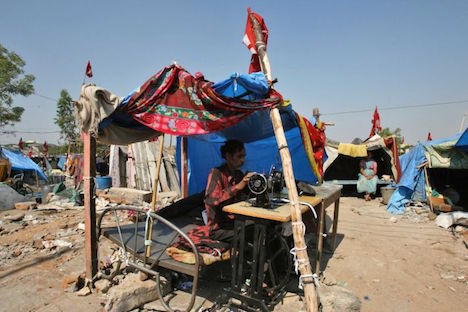Micro-financing may not be all it's cracked up to be
 Print This Print This
By Thomas Oriti, ABC
Australian Broadcasting Commission
Monday, Mar 28, 2016
Micro-financing poverty-stricken communities can lead to increased debt levels, suicide, study finds
 |
| PHOTO: Mohammed Rasheed took a loan of $394 from a micro-finance company to start his own tailoring shop. (Reuters: Krishnendu Halder) |
The findings of a new study are challenging the long-held view that micro-financing can lift families in the developing world out of poverty.
After months of research in Bangladesh, Dr Laurel Jackson from Western Sydney University has warned that providing small loans to impoverished families is dramatically increasing stress and debt levels.
Micro-financing dates back to the 1970s in Bangladesh, where small loans were given to poor people who did not have access to banks.
Now the idea has spread across the world, and the pioneer, Professor Muhammad Yunus, was awarded the Nobel Peace Prize a decade ago.
In 2014, he told the ABC that everyone had the capability to be entrepreneurs.
But Dr Jackson's research challenges the idea that everyone has the skills to use the money wisely.
"There's enough evidence now, not just from my study, to make us question whether this is really a sustainable way of supporting these very vulnerable communities," she said.
Dr Jackson visited three farming communities in Bangladesh over a five-year period.
She spent months living with local families who were receiving small loans from non-governmental organisations.
"The popular belief is that this money gets repaid very quickly. But the way that happens is that these people will have to go and borrow from somebody else," she said.
Dr Jackson said micro-financing could actually lead to a higher level of debt. In some cases, the inability to pay back loans had driven people to take their own life.
She insisted her findings were part of a global trend, saying it was unreasonable to expect that people in poor communities would use the loans to make wise business decisions.
But Associate Professor Ranjit Voola from the University of Sydney has spent years researching the role of business in alleviating poverty.
He said a lot of work had been done to give people the skills they needed.
"Many may not have the skills. But there are quite a few who have actually benefitted from this," he said.
"I'm aware of something called 'marketplace literacy', where the objective of that is to actually educate these people about financial decision making."
He said micro-financing played a key role in the fight against poverty, but agreed that it could be implemented better in some parts of the world.
"You can't just give people money and say, 'Just be entrepreneurs'. That has to be, I guess, augmented by some kind of education on how to be literate in the marketplace," he said.
"I think that the problem with micro-finance has been that it was so successful when it first came out that people thought that is the solution.
"Micro-finance is not the solution for poverty alleviation; but it's part of the solution, with many other different things."
Source URL
|
 Print This Print This

|

